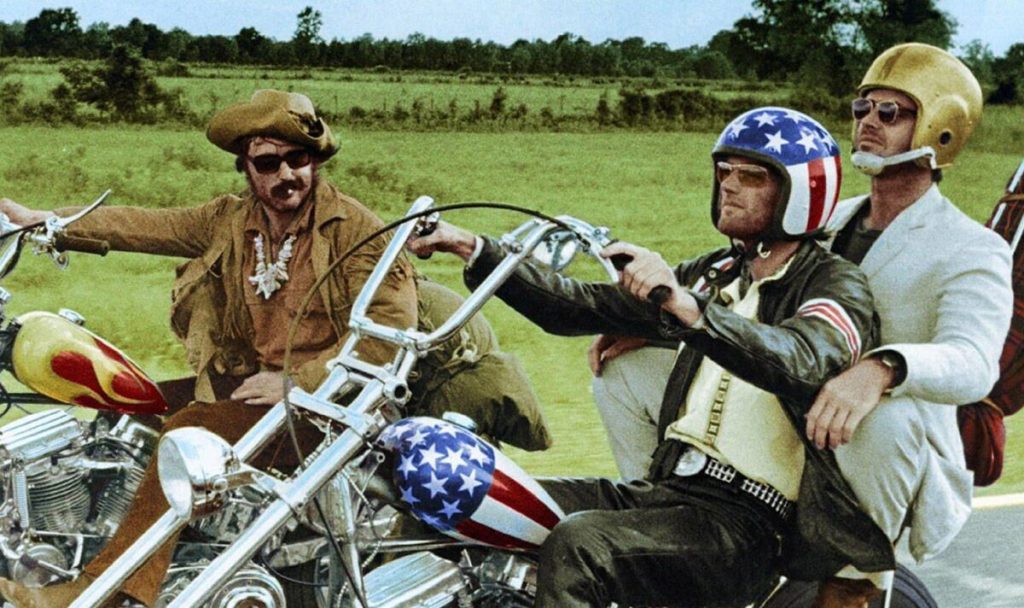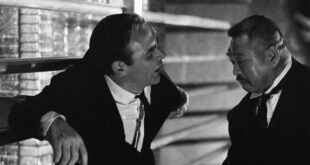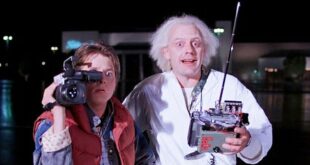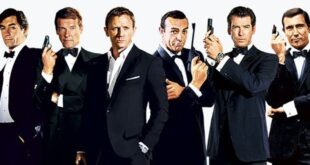
Easy Rider was a pop culture phenomenon and established Peter Fonda (son of legend Henry Fonda and brother of Jane Fonda) and Dennis Hopper as two of the brightest and most significant stars of the era. They fought hard against an entrenched, reactionary Hollywood system to get it made, but the triumph was tainted by a lifelong feud that exploded before the film was even released. Decades later, during the 1998 Oscars, Peter Fonda and Jack Nicholson were both nominated for Best Actor, for Ulee’s Gold and As Good As It Gets, with the latter triumphing on the night. Both had starred decades earlier in 1969’s Easy Rider. At the Entertainment Weekly viewing party, their co-star Dennis Hopper glared when Fonda was shown and cheered for Nicholson. It had been twenty years, but he had not and would never bury the hatchet.
Fonda always publicly insisted he had done nothing wrong and declared he had repeatedly tried to reach out: “One can imagine the love-hate relationship I’ve had with him all this time.… Of course, I didn’t think twice about his vow never to speak to me again.… Of course, I go to see all his work, and I call him to tell him how I liked it.”
Hopper refused to varnish his side of the story, bluntly saying: “We weren’t friends when we shot the movie. Jack Nicholson and I are friends.”
Fonda and Hopper didn’t just star in Easy Rider, they created the concept, screenplay and filming style together but it ultimately led to one of the greatest rifts in Tinseltown history.
Fonda described how he came up with the idea of two counter-culture anti-heroes riding their motorbikes across America after seeing a still of himself and Bruce Dern in the 1966 biker movie The Wild Angels.
Fonda had starred with Hopper in 1967 psychedelic drama The Trip (written by actor Jack Nicholson) and asked him to come on board Easy Rider as director and co-star. Together they worked with screenwriter Terry Southern, although much of the dialogue is improvised.
The film helped change Hollywood with its naturalistic and gritty look at modern issues, alongside a radical use of natural light, outdoor locations and a revolutionary soundtrack drawn from contemporary music. On a tiny $400,000 budget (plus $1million for music licencing) it grossed over $60million, was the toast of the Cannes Film Festival and earned Oscar nominations for Nicholson and the three screenwriters.
Behind the scenes there had already been major tension with Hopper. His original cut of the film took over five months and was around four hours long. Fonda needed him out of the way.
He said: “After 22 weeks, we sent Hopper and his girlfriend off to Taos. Myself, William Hayward, Bob Rafelson, Jack Nicholson, Donn Cambern went to work in the editing room at Columbia and took the film down to 96 minutes.”
They discovered over 22 lengthy riding scenes (the final cut has a third of that), alongside a protracted fireside passage with Hopper talking endlessly while Nicholson and Fonda sit by.
Fonda later said of that scene (which was recut and restored for the final edit): “We never shot it his way … Give me a f***ing break, Dennis.”
Hopper may have been unhappy with the new cut, but he was furious over being denied what he viewed as his rightful financial due. The screenwriting rewards were split three ways but Hopper claimed he had been promised the only slightly greater 40%. In 1992 he sued Fonda over the screenwriting rights and it was settled out of court.
Southern always sided with Fonda, saying in 2016: “You know if Den Hopper improvises a dozen lines and six of them survive the cutting room floor he’ll put in for screenplay credit. Now it would be almost impossible to exaggerate his contribution to the film—but, by George, he manages to do it every time.”
Nevertheless, Hopper sued Fonda again in 1996 for the full 40% he believed he was owed and it was settled out of court.
Fonda later said: “My contract with him was the same, he just felt that he deserved to have that. He got millions from me that he misappropriated investing in phony gold mines. That’s his problem. I mean, it’s a shame, because he was too whacked out on drugs. I just think that he was so caught up in his own megalomania and his own bitterness that he couldn’t see that I treated him quite fairly and that I respected his genius and his work.”
Again, it was settled out of court. It had been 27 years since the film was released and both stars had had long and successful careers, but Hopper still refused to speak to or forgive Fonda.
In his 1998 autobiography Don’t Tell Day, Fonda wrote: “Dennis Hopper is still insisting that he alone wrote the screenplay to Easy Rider, and has sued me for cheating him out of ‘millions and millions of dollars’ … It blows my mind.”
Hopper died on May 29, 2010. Nicholson led the mourners at his June 2 funeral alongside stars like Val Kilmer. But the door was still barred to one Hollywood legend.
Fonda said: “Well, I knew that Dennis was dying and I made many attempts to see Dennis as did Bert Schneider [the Easy Rider financier]. But he refused to see us. The funeral service was in a chapel in Taos, New Mexico. I rented a private jet and flew in, but I was not allowed in the chapel. So as much as I wanted to pay my respects, to Dennis and his family, I was not allowed to be a part of it.”

 Latest Breaking News Online News Portal
Latest Breaking News Online News Portal




